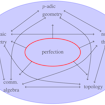Quanta Magazine‘s Natalie Wolchover and Staff Awarded the 2022 Pulitzer Prize for Explanatory Writing

The staff of Quanta Magazine, notably senior editor Natalie Wolchover, have won the 2022 Pulitzer Prize for explanatory writing “for coverage that revealed the complexities of building the James Webb Telescope, designed to facilitate groundbreaking astronomical and cosmological research.”
“It’s the honor of my life and a tremendous recognition for our whole team and for our ethos at Quanta,” Wolchover says. “And given how much there is to be sorrowful about in the world today, I’m also thrilled that the Pulitzer jury has recognized an uplifting story about the best aspects of humanity: our curiosity, ingenuity and resolve.”
“For a small science outlet like Quanta to win the top award in journalism is beyond words,” says Quanta editor-in-chief Thomas Lin. “It required an enormous amount of elbow grease and resourcefulness and the kind of smart reporting that Natalie’s been doing for years.”
Through thorough, tireless reporting, Wolchover assembled arguably the definitive article on the James Webb Space Telescope: “The Webb Space Telescope Will Rewrite Cosmic History. If It Works.”
Quanta published the article in December 2021 in the weeks leading up to the project’s Christmas launch. Her story covers the pressing scientific questions waiting to be answered and the at times tumultuous history of the project, which ballooned to a $10 billion price tag and survived multiple rounds on the budgetary chopping block.
The article was edited by Quanta deputy editor Michael Moyer and accompanied by a video by Emily Buder. “We hope this helps inspire other science journalists and science publications to tackle some of these big, complicated subjects that are truly important,” Lin says.
As a senior editor for Quanta Magazine, Wolchover writes about cutting-edge research and mysteries in the physical sciences. She has a bachelor’s degree in physics from Tufts University, studied graduate-level physics at the University of California, Berkeley, and co-authored several academic papers in nonlinear optics. Her writing has been featured in The Best American Science and Nature Writing and The Best Writing on Mathematics and has won several awards, including the 2016 Evert Clark/Seth Payne Award and the American Institute of Physics’ 2017 Science Communication Award for Articles.
Quanta Magazine is an award-winning, editorially independent publication launched by the Simons Foundation to illuminate big ideas in science and math through public service journalism. Its reporters and editors focus on developments in mathematics, theoretical physics, theoretical computer science and the basic life sciences, emphasizing timely, accurate, in-depth and well-crafted articles for its broad discerning audience.
Lin says that the recognition “is validating the kind of science journalism that Quanta has been practicing. We hope to continue doing impactful work and investing in excellent writers like Natalie and editors like Michael.”


